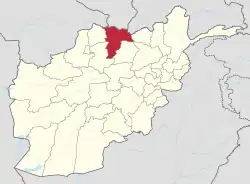Mazar-i-Sharif International Airport
Mazar-i-Sharif International Airport (Dari: میدان هوائی مزار شریف, Meydâne Havâyeye Mazâre Šarif; Pashto: مزار شریف نړیوال هوايي ډګر) (IATA: MZR, ICAO: OAMS),[4] also known as Mawlānā Jalāl ad-Dīn Muhammad Balkhī International Airport, is located 9 km east of Mazar-i-Sharif in northern Afghanistan, a journey of 15 minutes by taxi from the center of the city. It comes with a dual-runway capable of handling large aircraft such as Boeing 747, Boeing C-17 Globemaster III and Antonov An-225. The airport has facilities for up to 1,000 passengers,[5] making it one of the largest airports in Afghanistan.[6][7]
Mazar-i-Sharif International Airport میدان هوائی مزار شریف مزار شریف نړیوال هوايي ډګر | |||||||||||
|---|---|---|---|---|---|---|---|---|---|---|---|
 | |||||||||||
| Summary | |||||||||||
| Airport type | Civilian/Military | ||||||||||
| Owner | |||||||||||
| Operator | |||||||||||
| Serves | Northern Afghanistan | ||||||||||
| Location | Mazar-i-Sharif, Afghanistan | ||||||||||
| Built | 1960s[1] | ||||||||||
| Elevation AMSL | 1,287 ft / 392 m | ||||||||||
| Coordinates | 36°42′25″N 67°12′34″E | ||||||||||
| Website | mazaresharifinternational | ||||||||||
| Map | |||||||||||
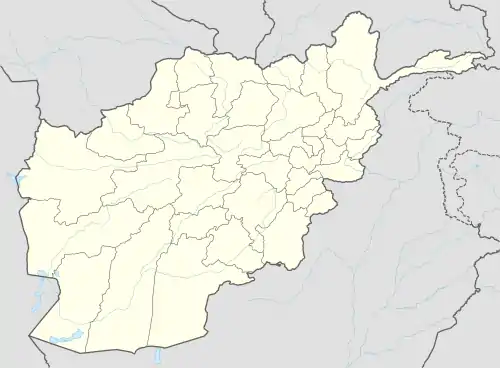 MZR Location of airport in Afghanistan | |||||||||||
| Runways | |||||||||||
| |||||||||||
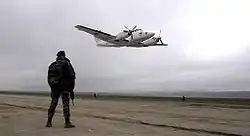
Originally built by engineers from the United States in the 1960s,[1] the airport serves the Afghan population in the north of the country. A new 60 million euro terminal was added to the airport in recent years while the older terminal is now used for domestic flights.[8][9][10]
The airport is also home to the Afghan Air Force 4th (304th) Wing.[11]
History
Early years
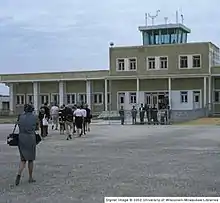
Mazar-i-Sharif Airport was built in the 1960s by the United States during the Cold War,[1] when the Soviets and the Americans were engaged in spreading their influences in the Middle East and South Asia.[12] Between the 1960s and late 1970s, for the first time large number of tourists began arriving to see historical places in the city.
The airport was heavily used in the 1980s by the Soviet forces from which they launched daily flight missions to hit targets in the Mujahideen controlled territories of Afghanistan. It also served as one of the main hubs for deploying troops from the neighboring former Soviet Union.
21st century
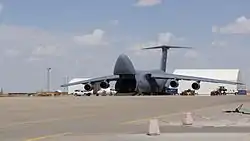
Germany took command of the International Security Assistance Force (ISAF)'s Regional Area North at the end of March 2006. The airfield functions as a main hub for the exchange of personnel as well as air cargo for the international stabilisation and peace support forces in northern Afghanistan. Since September 2007 a TACAN installation for an instrument landing system is available for bad weather operation.[13] Camp Marmal was built next to the airport in 2005, which has gradually expanded to one of the largest military bases in Afghanistan. It serves all ISAF personnel, including U.S. and Afghan Armed Forces.
On 30 June 2014 the Royal Netherlands Air Force detachment of General Dynamics F-16 Fighting Falcon's ended.[14]
Work on a new international terminal began in 2010 and was completed in 2013. A special inauguration ceremony was held in June 2013, which was attended by German Foreign Minister Guido Westerwelle, Afghanistan's Transport and Aviation Minister Daoud Ali Najafi, Balkh's Governor Atta Muhammad Nur and some parliamentarians. After the inauguration, the airport was named Maulana Jalaluddin Balkhi International Airport. The expansion of the airport was a joint venture of Germany and the United Arab Emirates (UAE), which cost 60 million euros and took about three years to complete. The project was overseen by a Turkish company.[5][6][15] The airport's new international terminal takes its name from Maulana Jalaluddin Balkhi, also known as Rumi.[16]
Airlines and destinations
| Airlines | Destinations | Refs |
|---|---|---|
| Ariana Afghan Airlines | Ankara, Istanbul, Kabul, Moscow–Sheremetyevo | [17] |
| Kam Air | Delhi, Kabul, Mashhad, Peshawar, Tehran–Imam Khomeini | [18] |
| Turkish Airlines | Istanbul | [19] |
References
- Smith, Harvey Henry (1969). Area Handbook for Afghanistan (fourth ed.). Washington, D.C.: U.S. Government Printing Office. p. 36.
The airports at Kandahar, Herat, Mazar-i-Sharif and Kunduz were built with United States assistance.
- Airport record for Mazar-e-Sharif Airport at Landings.com. Retrieved 2013-8-1
- "AIP - Important Information - Civil Aviation Authority". Archived from the original on 17 June 2016. Retrieved 20 June 2016.
- Flightradar24. "Live Flight Tracker - Real-Time Flight Tracker Map". Flightradar24. Retrieved 2020-09-07.
- "Balkh airport terminal inaugurated". Pajhwok Afghan News. 9 June 2013. Retrieved 2013-06-09.
- "Willkommen bei der KfW Entwicklungsbank". Retrieved 20 June 2016.
- images of Mazar-i-Sharif Airport Archived 2012-04-24 at the Wayback Machine
- "Mazar-e Sharif, Afghanistan's biggest international airport". Retrieved 20 June 2016.
- "Skyscanner". www.skyscanner.net. Retrieved 2020-09-19.
- "Mazar-I-Sharif Airport, Afghanistan - Wegoreise.de". www.wegoreise.de. Retrieved 2020-09-22.
- "METAR TAF : Mazar-i-Sharif International Airport, Mazar-i-Sharif Afghanistan". en.allmetsat.com. Retrieved 2020-09-11.
- Richard (27 November 2009). "Defence of the Realm: The forgotten country". Retrieved 20 June 2016.
- "Allied Joint Force Command Brunssum". Archived from the original on 27 July 2006. Retrieved 20 June 2016.
- AirForces Monthly. Stamford, Lincolnshire, England: Key Publishing Ltd. October 2014. p. 33.
- "Archived copy". Archived from the original on 2013-06-12. Retrieved 2013-11-20.CS1 maint: archived copy as title (link)
- "Handy Mazar-I-Sharif airport information from Skyscanner". www.skyscanner.net. Retrieved 2020-09-10.
- "Flight Schedule". www.flyariana.com.
- https://www.flightradar24.com/data/airports/mzr
- "Istanbul New Airport Transition Delayed Until April 5, 2019 (At The Earliest)".
External links
![]() Media related to Mazar-i-Sharif International Airport at Wikimedia Commons
Media related to Mazar-i-Sharif International Airport at Wikimedia Commons
- Controlling the Air in Mazar-e-Sharif on YouTube, January 5, 2018, Resolute Support Mission.
- Mazari Sharif Airport Information
- Afghanistan to Open Third International Airport in Early 2012
- Mazari Sharif Airport military role
- Current weather for OAMS at NOAA/NWS
- Airport record for Mazar-e-Sharif Airport at Landings.com
